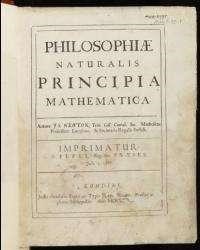
In a project that has long been overdue, Cambridge University, thanks to a hefty gift from the Polonsky Foundation (supporter of education and arts) and a grant from Britain’s Joint Information Services Committee (JISC), has put some of Isaac Newton’s original papers online for any and all to see. Of particular interest to most will be Newton’s own annotated copy of Philosophiae Naturalis Principia Mathematica, considered by many to be one of the greatest published works by any scientist ever. For those looking for a little behind the scenes work, the University has also published Newton’s so-called “Waste Book,” a diary of sorts that Newton inherited from his step-father which he took along with him and used for jotting notes about such things as his ideas on calculus while away from school due to the Great Plague in 1665.
In viewing the material, which can be paged through in a PDF type format, by clicking arrows, it’s easy to see that the digitization of Newton’s papers have come none too soon, as many of the pages are tattered, smeared and even burned-looking in some places. Thus, not only has putting the papers online made them accessible to anyone with a computer and an Internet connection, it has also caused them to be saved for posterity in an electronic form that will ensure they will be accessible to all those who may wish to view them in the future as well.
It was in Principia Mathematica that Newton laid out his theories on the laws of motion and universal gravitation which some suggest laid the groundwork for Einstein’s theories on relativity. And if that weren’t enough, Newton is also widely credited with “inventing” calculus, a mathematical science without which the modern world would simply not exist.
In all there are more than 4,000 pages of Newton’s work displayed on the site, which took a team of photo copyists the better part of this past summer to capture, though it’s obvious in looking at the results that there were many slow-downs as pages had to have some restorative efforts made in order to present them. Those working on the project are to be commended as the results show great care and dedication to a single purpose; namely showcasing one of history’s brightest minds.
It’s intriguing to see the notes Newton himself made on the first edition of Principia Mathematica, in preparing for the second, and happily, the University has announced that they will be adding translations for all of the text and notes as early as next year.
The University has also announced plans to make the works of other famous scientists available as the future unfolds and hopefully will continue to add more of the Newton library too, as thus far only about 20% of their collection has been made available online.
For more such insights, log into our website https://international-maths-challenge.com
Credit of the article given to Bob Yirka , Phys.org
